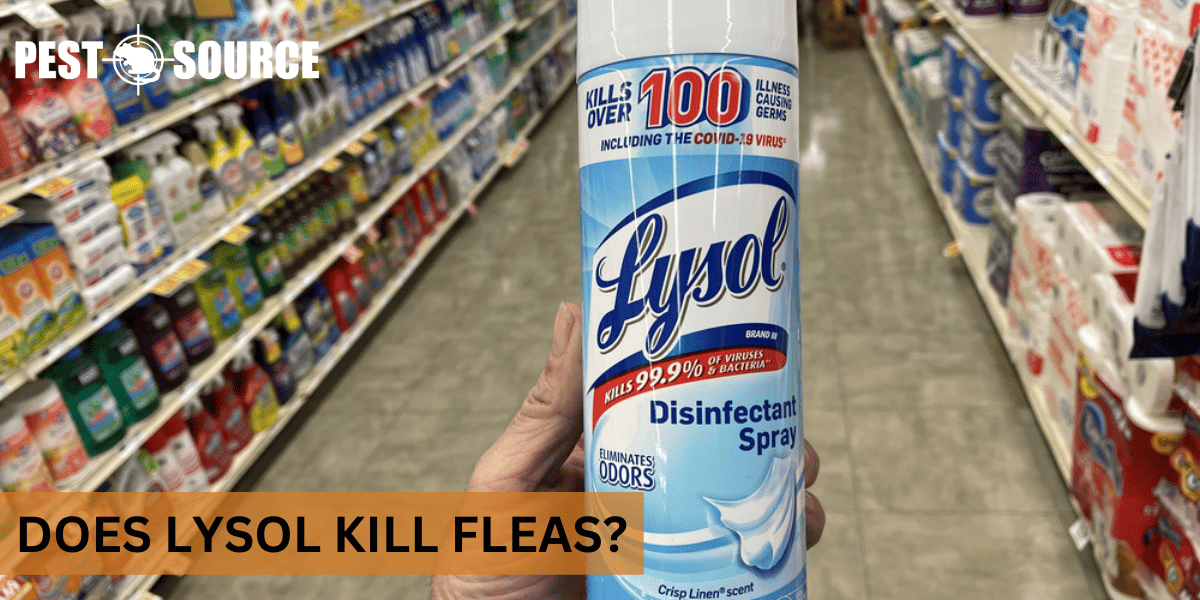Lysol can kill fleas on contact, as it contains ingredients that are toxic to these pests. However, it’s not a recommended solution for flea infestations, as it doesn’t address fleas in all life stages and can be harmful if misused. Read on to learn about more effective and safer methods for controlling fleas in your home.
POINTS
- Lysol can kill adult fleas and is less effective against flea larvae and eggs, making it important to use it as part of a comprehensive pest control strategy.
- When using Lysol or any chemical cleaner, safety for pets is paramount; it’s vital to ensure proper ventilation, dilution, and to keep pets away from treated areas until completely dry.
- Alternative and natural methods, such as diatomaceous earth and essential oils, can be effective in controlling fleas and are worth considering for those seeking non-commercial options.
- Before using Lysol on carpets, conduct a spot test to avoid damage, use it sparingly to prevent excess moisture, and vacuum after drying to remove any dead fleas, eggs, or larvae.
Effectiveness of Lysol Against Fleas
Lysol’s ability to kill adult fleas comes from its active ingredients, which include ethanol/SD Alcohol, which is a solvent, and Benzalkonium Chloride, a known disinfectant with varying levels of efficacy against germs. These ingredients can be toxic to fleas, leading to their death upon contact. However, when it comes to larvae and eggs, Lysol may not be as effective. Flea larvae are more resistant to chemicals because they often reside deep in carpets or bedding, where the spray might not reach them.
Does Lysol Kill Flea Eggs?
Addressing the lifecycle of fleas is crucial for preventing future infestations. Lysol is less effective against flea eggs. These eggs are typically laid in hard-to-reach places and are protected by a tough outer shell. Regular cleaning with Lysol might help by removing some of the eggs mechanically, but it’s not a reliable method to count on for complete elimination.
Is Lysol Safe for Pets?
When using Lysol or any chemical cleaner, safety for pets is a significant concern. Lysol contains chemicals that can be harmful to pets, especially cats, due to their sensitivity to phenols, a compound found in many disinfectants. To safely use Lysol in a home with pets:
- Ensure the room is well-ventilated.
- Follow dilution instructions carefully.
- Keep pets away from treated areas until completely dry.
- Consider treating areas that pets cannot access.
Always consult with a veterinarian before using products like Lysol around your pets, and consider pet-safe alternatives for pest control whenever possible.
What Can I Mop With to Kill Fleas?
Mopping can play a role in controlling flea infestations. Adding certain additives to your mop water can increase its effectiveness against fleas. Safe and effective additives include:
- Hot water: The heat can help kill fleas on contact.
- Vinegar: Its acidity can deter fleas without using harsh chemicals.
- Essential oils: Some, like lavender or lemongrass, can repel fleas naturally.
When mopping, focus on thorough coverage and pay special attention to nooks and crannies where fleas might hide. Remember to regularly wash and replace mop heads to prevent spreading eggs or larvae.
Can You Spray Lysol on Carpet?
When it comes to using Lysol on carpets, caution is key. While Lysol can kill fleas on contact, it’s essential to consider the potential impact on carpet fibers and dyes. Before liberally spraying Lysol, test a small, inconspicuous area of your carpet to ensure there’s no discoloration or damage. If the test area remains unchanged, you can proceed with the following guidelines:
- Spray Lysol lightly, avoiding saturation, as excess moisture can encourage mold growth.
- Allow the carpet to dry completely before allowing pets or family members to come into contact with the area.
- Vacuum the carpet thoroughly after it has dried to remove any dead fleas, eggs, or larvae.
Remember, while Lysol can help in the short term, it is not a substitute for professional pest control services or flea treatments specifically designed for carpets and upholstery.
Household Cleaners That Kill Fleas
Lysol is just one of many household cleaners that can aid in the fight against fleas. When comparing its effectiveness, it’s important to consider that not all cleaners have insecticidal properties. Some alternative household cleaners that may kill fleas include:
- Dish soap and water solution: This can suffocate adult fleas when used in a flea trap.
- Vinegar-based solutions: These can deter fleas due to their acidity but may not kill them outright.
For those seeking non-commercial options, natural methods like diatomaceous earth can be sprinkled on carpets to dehydrate and kill fleas. Essential oils, such as eucalyptus, peppermint, and cedarwood, can also repel fleas when used properly. However, always research and use caution as some natural solutions can be harmful to pets and humans if misused.
Does Bleach Kill Fleas?
Bleach is effective in killing fleas and their eggs when used on hard, non-porous surfaces. It’s important to use bleach cautiously, as it is a strong chemical that can be harmful to pets and humans if not used properly. Bleach should never be used directly on pets and is ineffective in treating flea infestations on animals or in porous materials like carpets or bedding.
Does Rubbing Alcohol Kill Fleas?
Rubbing alcohol can kill fleas by causing dehydration, but it is not an ideal solution for flea control. When applied directly, rubbing alcohol can effectively kill adult fleas, but it has no residual effect to prevent future infestations. However, its use is limited due to potential health risks to pets and humans, especially if inhaled or ingested. Additionally, rubbing alcohol does not kill flea eggs or larvae, so it’s ineffective for complete eradication of an infestation. It’s also important to avoid using rubbing alcohol on pets, as it can be harmful to their skin and health.



